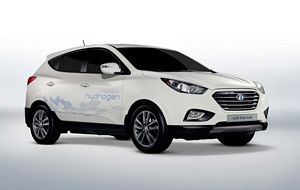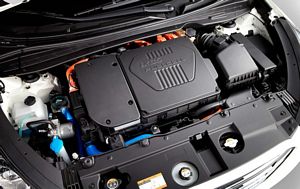|
By accessing or using The Crittenden Automotive Library™/CarsAndRacingStuff.com, you signify your agreement with the Terms of Use on our Legal Information page. Our Privacy Policy is also available there. |

Hyundai launches hydrogen fuelled car - ix35 Fuel Cell Vehicle
|
|---|
|
|
Hyundai launches hydrogen fuelled car - ix35 Fuel Cell Vehicle
Matt Hubbard
Speedmonkey
September 27, 2012
For years now the sensible amongst us have been banging on about hydrogen being the future of alternative - i.e. non-petrochemical - fuel cells.
Electric engines are all well and good but they do have their limits - literally. Usually about 60 miles. And then an overnight charge to get going again. And in order to reach higher ranges massive compromises have to be made to reduce weight and friction. Skinny tyres? No thanks.
And that's without looking at how the electricity that powers these EVs is made - usually by burning coal or gas. Which isn't very clean.
So it is with open arms that we welcome the news that Hyundai has launched the hydrogen powered ix35 Fuel Cell Vehicle.
Production begins in December 2012 with an aim to build 1,000 cars a year by 2015 - and it will only be available for lease. Because with such an early technology comes the usual problem of lack of refuelling sites. Two cities, in Denmark and Sweden, have signed up to lease ix35 Fuel Cells and provide a refuelling network.
Beyond 2015 Hyundai hope to make 10,000 ix35 Fuel Cell's a year.
The car's hydrogen fuel charges a Lithium Polymer battery which in turn drives an electric engine. Power is 100kW - which is roughly 134bhp.
Refuelling takes just a few minutes and it has a range of 365 miles - take that EVs! 0-62mph is 12.5 seconds, which isn't too shabby for an SUV, and top speed is 100mph.
Another fact worth noting is that the ix35 Fuel Cell uses ambient, rather than compressed air, which reduces losses in the system as well as the problem of storing it. It also uses a KERS system which produces more power under braking.
So the technology is here. If more manufacturers develop hydrogen powered vehicles - which they should be doing - then the refuelling network will grow and we will see more and more hydrogen cars on our roads. And that can only be a good thing.



















